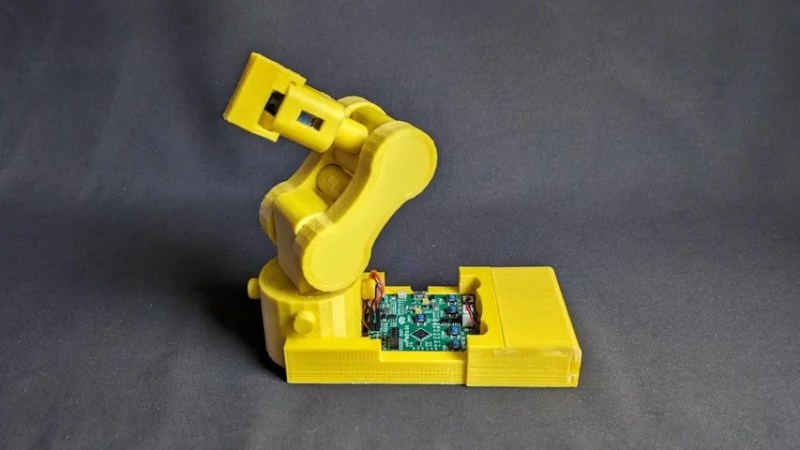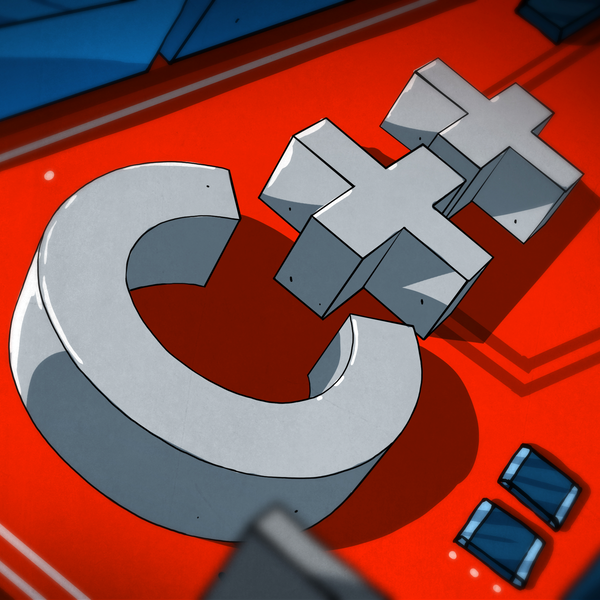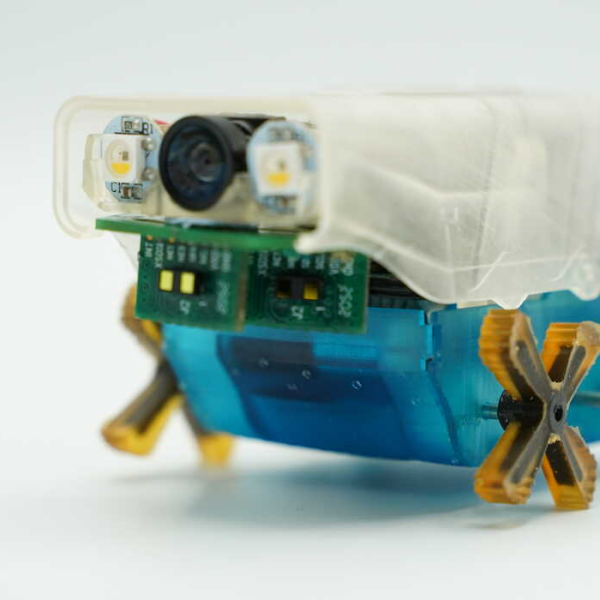Whether you’re a kid or a kid at heart, learning about science and engineering can be a lot more fun if it’s practical. You could sit around learning about motors and control theory, or you could build a robot arm and play with it. If the latter sounds like your bag of hammers, you might like Pedro 2.0.
Pedro 2.0 is a simple 3D-printable robot arm intended for STEAM education. If you’re new to that acronym, it basically refers to the combination of artistic skills with education around science, technology, engineering and mathematics.
The build relies on components that are readily available pretty much around the world—SG90 servo motors, ball bearings, and an Arduino running the show. There’s also an NRF24L01 module for wireless remote control. All the rest of the major mechanical parts can be whipped up on a 3D printer, and you don’t need a particularly special one, either. Any old FDM machine should do the job just fine if it’s calibrated properly.
If you fancy dipping your toes in the world of robot arms, this is a really easy starting point that will teach you a lot along the way. From there, you can delve into more advanced designs, or even consider constructing your own tentacles. The world really is your octopus oyster.

















“If you’re new to that acronym”
I’m not new to it, just incredibly annoyed by people using it. There is no reason to combine STEM with the A. It was started by the RISD to insult science/tech/engineering/math. Please stop using it. Just because you can use STEM to create art, doesn’t mean it’s the same thing. Stop insulting STEM.
I rewrote this comment several times to try to make it respectful, but this is really infuriating.
You are wrong.
(I used to be as well, but that’s because I never bothered to find out what the “A” was actually for.)
No:
https://en.wikipedia.org/wiki/STEAM_education
It does need to just die, as it makes the acronym cover literally any education.
What I said is factually correct. Your last line confirmed that.
It’s because STEAM is a much cooler acronym than STEMD (D for Design).
Design, as in:
– Architecture
– Industrial (Product) design
– UX (Graphic) design
– Software development (esp. Software Architecture)
– Game design
– Many of the projects on Hackaday that aren’t in any other publication
You can’t make something unless you have an idea of what you’re trying to make. In American highschool, sometimes the closest you get is shop class.
Considering the acronym STEM isn’t about art, your comment doesn’t mean much to me.
Just because you can use technology, math, etc, to make art, doesn’t make it the same. Software development is not art. Game design is a combination of art and STEM, but in most cases, done by different teams. They aren’t the same.
You can spray-paint a car with tons of cool graphics, like the lowrider people love to do. That doesn’t mean you have to teach art in courses on car maintenance. Different fields exist for reasons. Trying to insult STEM is just evil.
As a software developer, I completely disagree. Art is defined as “the expression or application of human creative skill and imagination”. Software development is definitely art. Just because it’s not the traditional “fine art” stuff doesn’t mean its not art.
Year ago I was invited as a guest speaker for a technology conference. I didn’t know but they were doing this big push on S.T.E.A.M. with emphasis on the A. When asked how I felt about S.T.E.A.M. in education, I brought up how frustrating the push for more art in school was when trying to get more students ready for higher level education preparation. This was even more apparent in neighborhoods with few resources available for preparation to even get into universities and high education trade programs.
Wow, what’s with all the hatred towards art? It’s laughable to think that art is taking resources from ANYTHING else in education — many art teachers buy supplies for their classes with their own money when their budget isn’t sufficient.
And if STEAM introduces students to STEM, isn’t that a good thing?
Y’all sound crazy, in case you didn’t realize. Also, kudos to @peacemaker for the STEMD reference. PEACE OUT.
Art is taking people away from technology. The person you named yourself after would agree.
Exactly. Feynman turns in his grave.
STEAM removes people from STEM. That’s a major reason people are against it.
Back in de days I was part of a movement to try to get universities to drop arts degrees as they are useless, waste resources to get people to get degrees into a field that has no jobs waiting for them. The money could have been used for STEM instead. I still believe in it.
The arts teachers you are talking about are high school arts which is, imho, a useless thing to teach. Give classes about taxes or something instead. Something useful.
It feels like artists trying to piggyback on the prestige that comes with STEM: The A’s being like the Sanitation Engineers of the STEM world.
As a comment below put it:
“it makes the acronym cover literally any education”
Some block put an A for the following reason: “If you can’t/won’t join STEM then try make it worthless” :o)
BTW, the name is Pedrrrro (not the weird type pronounciation)
I’m going to let Adam Savage’s talk explain why its a good acronym. https://youtu.be/_otrgJ8Lmx4?si=Y3In3oddShm2ixhx&t=1011
STEM is over used. And wrongly used to sell robots or anything like that. They think parents need to see STEM to justify buying. They also think they don’t have a chance unless they make their products “for kids” because they think they won’t sell unless they do so. In short the “STEM” has been ruined by adults……and that is not surprising.
In order to quench all hot debates about it, I propose to use this robot arm to shove coals into an older type of train engine.
“The build relies on components that are readily available”
Mmmh… yeah… apart from the “Pedro Board 2.0” which is… a custom board… and I didn’t even found where it was sold (if it is available for sale anywhere…)
Didn’t see the kicad file or anything in the repository too…
There is a schematic on the Github page. That’s enuff for something that is free after all. More than you started with! All the items on the schematic seem pretty common.
For a “STEM” (or STEAM) project I’d rather have a standard arduino or esp32, something like a readily available option…
Sure there is a schematic, but who will design and make/order a board for this ?
I’d probably make such an effort for a “real” robotic arm, but not for a STEM/toy project
If it’s an “off the shelf” quick project I don’t expect to have a custom board
It’s probably not a big thing for the average hackaday reader, but it surely is a hurdle/constraint for the intended target
The arm seems to use standard-ass 9g servos you can buy for like $15 for ten of them on Amazon. All you need is a pwm signal to control it. The board is just the hardware level of an interface to control it from USB or whatever else they added. It’d probably be pretty straightforward code to write yourself. It is kind of dumb that they did it that way and then pitched it as an entry-level project, but otherwise, it looks like a pretty damn decent 3D-printable arm. I’ve actually been looking for one for a while, so this is pretty cool actually!
Same here. If you can support a source for the Board, please do so.
I asked on the repo – the board gerbers are not available so it is not exactly “readily available” right now.
I’m going to work on a fork that’s based on esp32 with a servo breakout board, like one of these jobs : https://www.amazon.com/ESP32-WROOM-32-Development-Bluetooth-Breakout-Expansion/dp/B0BFF745V2/
I get that the onboard buttons are cute from a ‘playing with it’ standpoint, but for an entry level project, a $10 off the shelf board that people can repurpose and reuse will be great, and pc/phone control will make it more useful for teaching basic programming of it, too.
Github repo now has a “coming soon” link to Kickstarter.